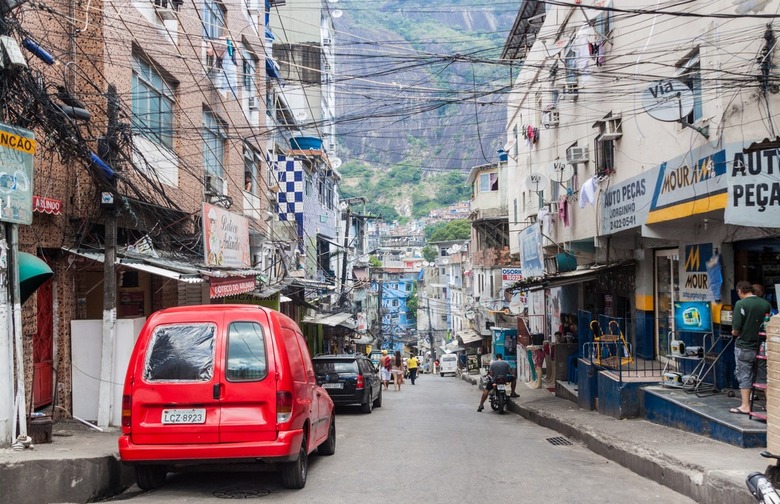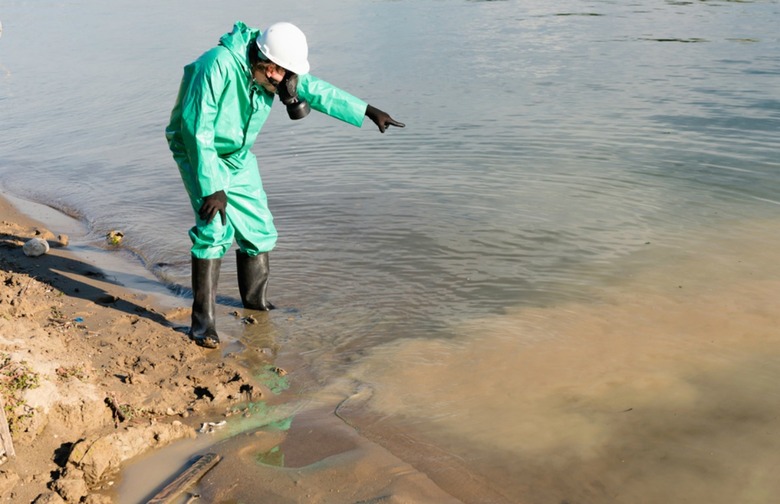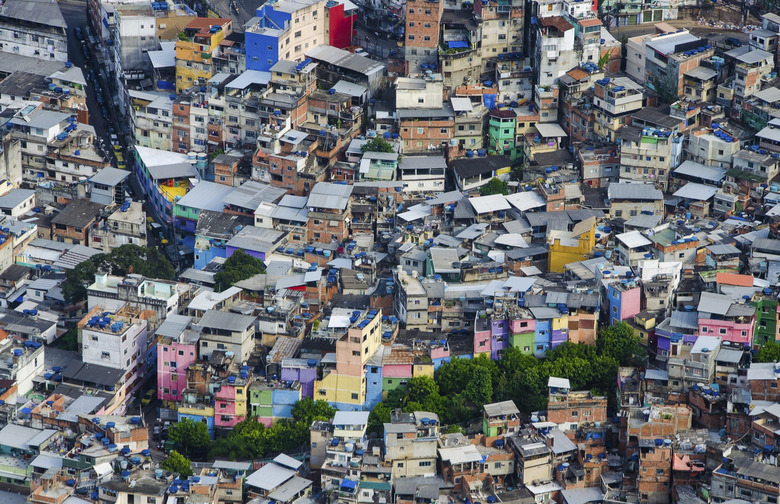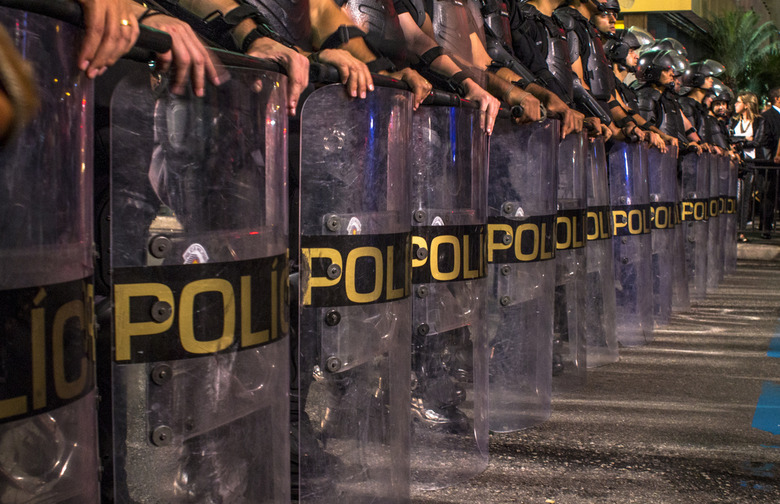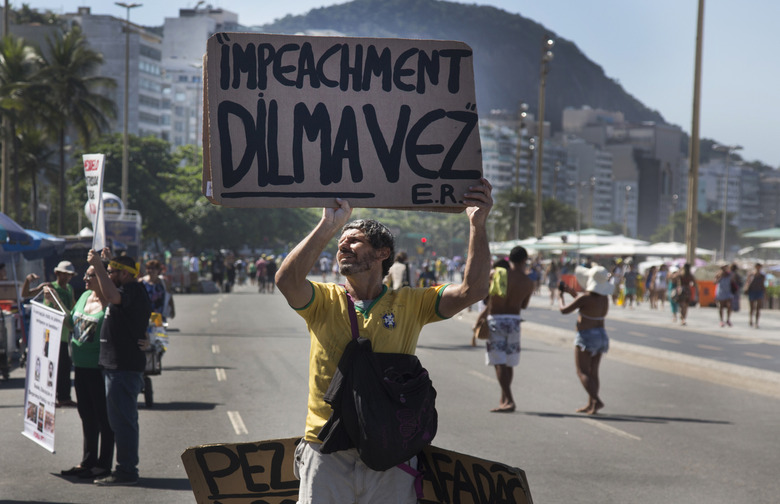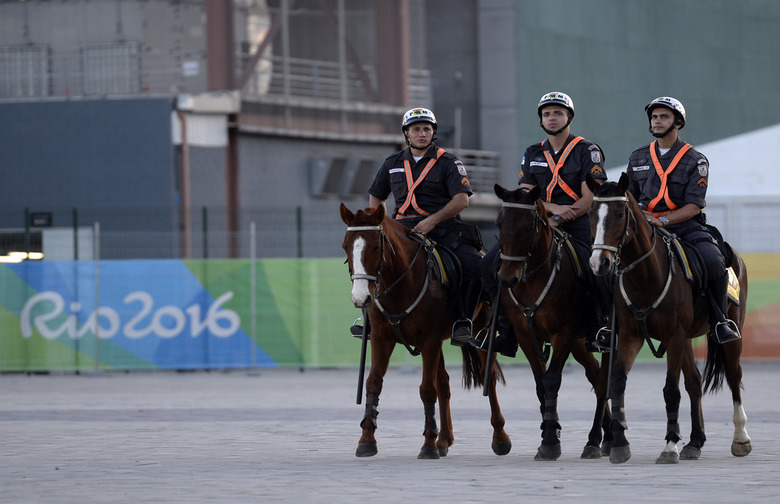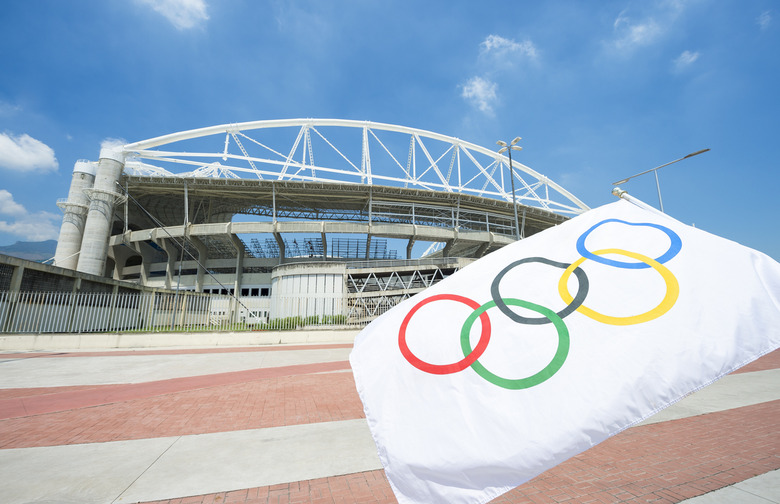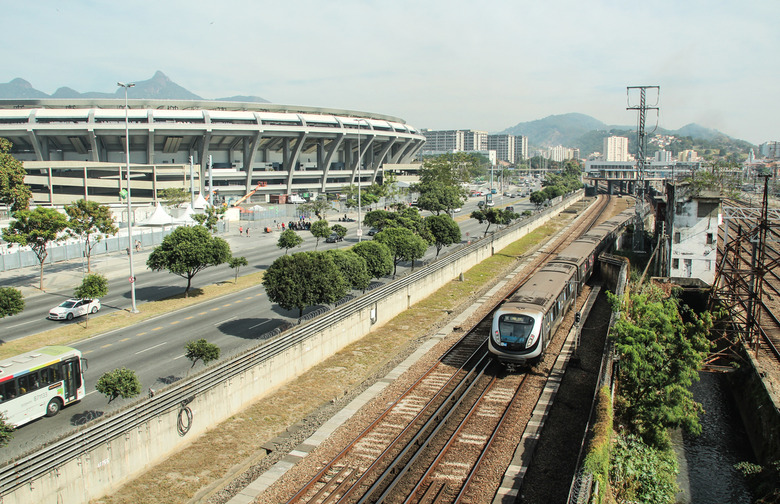9 Reasons Brazil Isn't Ready For The Olympics (Slideshow)
When the International Olympic Committee announced in 2010 that Rio would be hosting the 2016 Olympics, Brazil's gross domestic product grew by nearly seven percent. Since 2010, however, its GDP has plummeted. In the last two years, Brazil has entered its worst economic crisis in almost 100 years, with unemployment rising almost 11 percent, wages dropping drastically, and the state amassing a $6 billion deficit. The citizens of Brazil have been clamoring for improvements to housing, education, and poverty levels, but programs to assist in those areas have been cut and the country's money ($4.6 billion of it) has instead been directed toward the Olympics — despite the fact that economists dispute the notion that the Games provide any major economic benefit to host countries.
Environmental Woes
If you've ever been to Rio de Janeiro, or at least looked at it on a map (go ahead... I'll wait), you know that the city is situated on a large inlet known as Guanabara Bay, where Olympic events like sailing, rowing, and swimming (as part of the triathlon) will take place. What you may not know, is that the polluted waters of the bay have stricken practicing athletes and locals alike with rashes and vomiting-related illnesses due to the trash and raw human feces flowing into it. (The Associated Press' analysis of the bay's water found "disease-causing viruses directly linked to human sewage at levels up to 1.7 million times what would be considered highly alarming in the U.S. or Europe.") You may also not be aware that earlier this month, a group of Brazilian scientists detected a drug-resistant strain of super-bacteria growing off the local beaches that could cause meningitis and pulmonary, gastro, and bloodstream infections. We really can't put it better than The Washington Post, which called Guanabara Bay "the toilet bowl of Rio" — except for the fact that we don't know any toilet bowls containing severed feet, like the appendage that recently washed up near the Olympic volleyball venue.
Housing Crisis
Between 2009 and 2015, Rio activists claim that upward of 22,000 families (or about 77,000 people) were forcibly evicted from their Rio homes. The Brazilian government claims the relocations were mainly due to flood and landslide risks, with only about 10 percent related to World Cup- and Olympic-related infrastructure projects — but this figure is widely disputed. One neighborhood, Vila Autódromo in western Rio, has been almost totally demolished, with 90 percent of residents evicted in favor of building roads to the nearby Olympic Park. The government promised to upgrade other parts of the city to balance out this shift, but many of the plans have been delayed or killed completely.
Police Brutality
One of the biggest concerns of foreign visitors to Brazil has always been whether the country is safe (more on that in a bit). The country's solution to this problem, however, may have only made things worse. Brazilian police already ranked among the most deadly in the world, owning 580 killings in Rio in 2014, a 40 percent increase from the previous year. The number rose even further in 2015, to 645 killings, or one out of every five Rio homicides, with the victims comprised of a disproportionate amount of young, poor, black men. In December 2015, the United Nations even accused the Brazilian police force of systematically murdering poor black street children in an attempt to "clean the streets" in advance of the Olympics. Further complicating the country's problems, a recently passed "anti-terrorism" law related to the Olympics has reportedly criminalized numerous forms of peaceful demonstrations, meaning there is very little locals can do about these policing issues.
Political Chaos
Political stability is key in any country looking to host the Olympics, so it wasn't a good sign when Brazilian President Dilma Rousseff was caught up in a corruption scandal last December. It is alleged that Rousseff misused federal funds to obscure the size of Brazil's deficit and also faces charges of accepting illegal campaign contributions from Petrobras, the state-owned oil conglomerate. Adding insult to injury, Rousseff appointed Lula da Silva — who is also under investigation for the same reasons— as her chief of staff in March, leading to widespread protests in Brazil's largest cities. In May, the Senate voted to suspend her from the presidency pending a 180-day impeachment trial. Unbelievably, Vice President Michel Temer, currently acting as the interim president, is also under fire. In addition to compiling a 23-member cabinet comprised entirely of white men, his chosen congressional leader is a target of the same investigation as Rousseff and Silva and has even been accused of attempted murder.
Security Concerns
Police brutality is terrible, but the increase in unethical behavior by authorities is actually linked to the recent addition of tens of thousands of new police officers hired to keep Brazil safe during the Olympics. After all, this is the country that was already notorious for kidnappings, robberies, and murders. Still, things overall appear to be getting worse rather than better. Notable recent incidents include an Argentine tourist killed in February while fleeing a robber in Copacabana, armed motorcycle bandits that held up drivers in standstill rush hour traffic on a street lined with $500,000 condos last month, and just last week, New Zealand jiu-jitsu athlete Jason Lee said he was kidnapped by thieves dressed in police uniforms who forced him to withdraw cash from an ATM. Tourists in any country or city should exercise caution, but visitors to Rio need to be especially vigilant.
Worried about traveling? Here are the 10 safest countries to visit right now.
Temporary Accommodations
As we saw in Sochi, building temporary accommodations for the Olympics can go wrong in numerous ways. Australia's delegation made headlines recently after refusing to move into the Olympic Village, which is now open to arriving competitors. "We felt that our building was not safe, because of a combination of plumbing and electrical issues," the Australian chef de mission Kitty Chiller told journalists. Chiller specifically cited blocked toilets, leaky pipes, and exposed wiring as worrisome issues, saying some floors were completely uninhabitable. However, this is one issue that actually seems to be improving. Earlier this week, Chiller said Australia's delegation was pleased with the progress that has been made, and athletes may be moving from hotels to the Village as early as today. However, "more needs to be done," she cautioned.
Transportation Issues
Brazil's failure to finish many of its planned infrastructure projects before the 2014 World Cup led to widespread skepticism regarding whether it would be able to complete numerous upgrades intended for the Olympics. For instance, a crucial new $3 billion subway line is supposed to open prior to the Games that will connect Ipanema beach and the Olympic Park and Village in less than 15 minutes, but it has yet to be completed, even with 1,000 workers laboring around the clock at each station. As of now, Line 4, as it is called, may only operate with limited service, if at all. If the new subway section does open, it may not be fully tested before transporting Olympic passengers. Additionally, a 150-foot section of bike path in Rio collapsed into the ocean in April, killing two people. The section had only been opened three months prior to the accident, and was part of the Olympic legacy project. It's also worth noting that 11 workers have already died during Olympic-related construction projects.
Zika
The Zika virus — an infection that can causes microcephaly, severe brain malformations, and other defects in fetuses, as well as the risk of Guillain-Barré syndrome in adults — has reached epidemic-level status in the Americas and the Pacific. Since it is spread by mosquitos, people in tropical and subtropical climates are especially at risk, which currently includes almost all of Latin America. At least 150 scientists, doctors, and researchers have called for the Games to be postponed or moved, and numerous athletes, including golfers Rory McIlroy, Jason Day, Louis Oosthuizen, Marc Leishman, and Vijay Singh; cyclist Tejay van Garderen; basketballer Steph Curry; heptathlon champion Jessica Ennis-Hill; footballer Hope Solo; top tennis player Simona Halep; and long jumper Greg Rutherford have already dropped out due to Zika concerns. The United Nations and World Health Organization, for their part, have said while they don't recommend canceling or postponing the Olympics, they're nevertheless growing increasingly worried.
Worried about mosquitos? Click here for info about a fragrance that also repels bugs.
